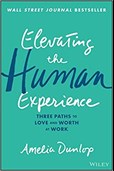- Behaviour
Feeling the Love—at Work
Amelia Dunlop’s guide to elevating human experience (and performance) at work by nurturing worth and growth through love
What we should bring to work is that bit of ourselves that makes us good at our job—a major part of which is being able to work well and empathetically with our colleagues, customers, and collaborators. As a leader it is also that part of ourselves that enables us to create a positive, creative, high-performing environment—a place where people feel self-worth and, dare we say it, loved.

This is the part of ourselves that Amelia Dunlop focuses on in her new book Elevating the Human Experience: Three Paths to Love and Worth at Work. From feelings of unworthiness experienced as child of divorced parents, feelings she denies are special, Dunlop has a keen sense of how people too often struggle to feel loved and worthy, and an understanding of the power of love to build self-worth. Her ‘revolutionary’ proposition is that this understanding—recognized universally in our personal lives—should be applied at work.
She argues that, before we consider organizational or digital transformation, we should prioritize human transformation—acknowledging people’s “intrinsic worth as a human, and nurturing growth through love.” The four reasons cited for this are not purely altruistic, but aimed at improving performance as well as wellbeing: i) The fundamental human condition is one of suffering; ii) The modern workplace has exacerbated this, with its problems of burnout, lack of inclusion, and lack of meaning and purpose; iii) Because it leads to greater productivity and creativity; iv) Because of what Dunlop calls the ‘intrinsic worthiness gap’. The gap between the importance of self-worth and the hard struggle to feel worthy.
I define love at work as the choice to extend yourself for the purpose of nurturing your own and another’s growth
For those who don’t believe authenticity has to rely on ‘letting it all hang out’ Dunlop’s thesis is inspiring. However, as she concedes, ‘love’ is a difficult word—from loving chocolate to erotic love it’s too broad a concept. What’s more many people, men in particular, are wary of expressing love. So, the definition she uses is very important: “I define love at work as the choice to extend yourself for the purpose of nurturing your own and another’s growth.” This sees love, not as an emotion, but as an intentional action—an endeavour that is kind and caring and potentially risky when it involves reaching into the unknown.
It is also important that a book, liable to be perceived as rather wooly, is in fact based on hard research—a quantitative study of 6,000 people in the US, undertaken by Dunlop to investigating and understand the impact of the worthiness gap. 50% of those surveyed said they struggled to feel worthy; while 84% said that they do their best work when they feel worthy.
The book is structured into three parts, each representing a separate ‘path’ to love and worth at work. The first path leads to loving ourselves when we show up for work; the second leads to recognizing the worth of another and connects to the worth we feel mirrored back to us—providing extra meaning to our lives; the third path involves the community of work—exploring how to overcome obstacles to love and worth in our organizations, systems, and culture, especially for those who may be marginalized, unseen, or unrepresented.
The transformational potential of Dunlop’s roadmap for ushering love into the workplace, fostering worth and championing our humanity is very clear. It may come as no surprise that 47% of women and 44% of men aged 25-34 (it’s worse for 18–24-year-olds) reported being talked over in meetings—office and workplace life is often far from loving or worthiness-affirming. Superficially sounding idealistic, Dunlop's proposal is in fact a realistic and practical route to authenticity, employee engagement, and going the extra mile, which goes with the better grain of human nature.
About the author: Amelia Dunlop has had a twenty-year career in management consultancy. She is the Chief Experience Officer at Deloitte Digital and leader of the US Customer Strategy and Applied Design practice for Deloitte Consulting LLP.
……………………………………………………………………………………………………………
ARTICLES YOU MIGHT LIKE
RESEARCH
LBS and ESMT study identifies the danger of citing information based on the ‘gist’ of the truth rather than the ‘literal’ truth
DEVELOPING LEADERS QUARTERLY MAGAZINE AND WEEKLY BRIEFING EMAILS

































